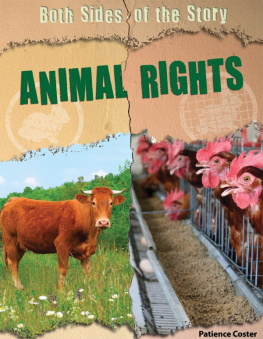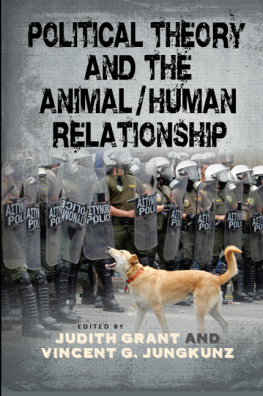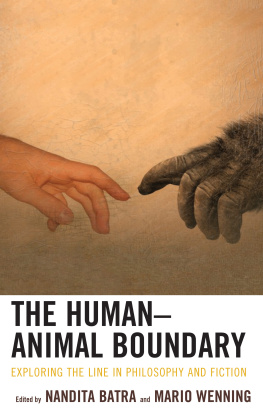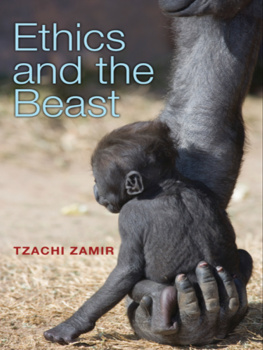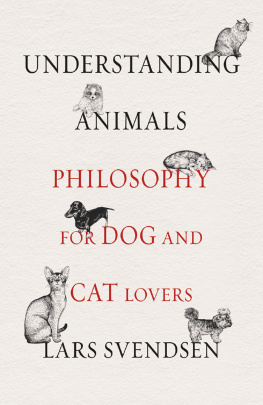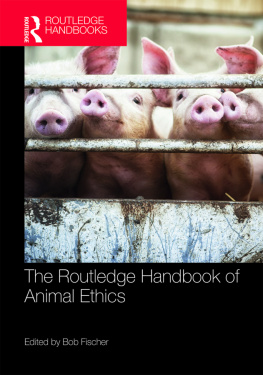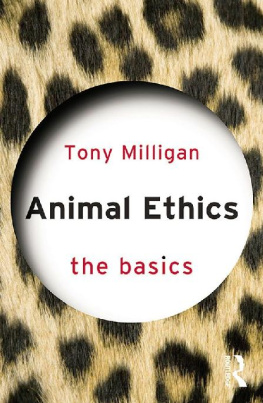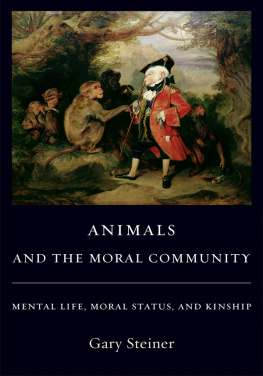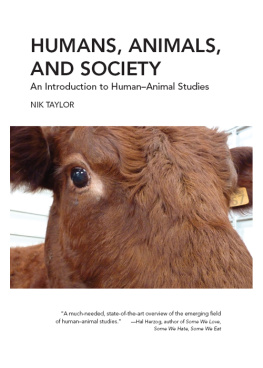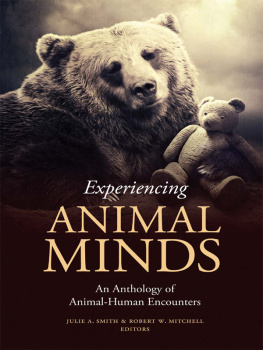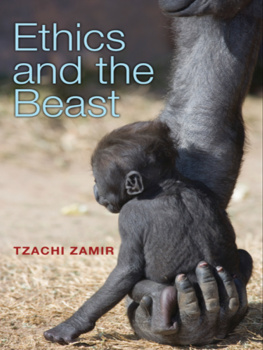ANIMAL LESSONS

Animal Lessons
How They Teach Us to Be Human
KELLY OLIVER
Columbia University Press New York
Columbia University Press
Publishers Since 1893
New York Chichester, West Sussex
cup.columbia.edu
Copyright 2009 Columbia University Press
All rights reserved
E-ISBN 978-0-231-52049-2
Library of Congress Cataloging-in-Publication Data
Oliver, Kelly, 1958
Animal lessons : how they teach us to be human/Kelly Oliver.
p. cm.
Includes bibliographical references and index.
ISBN 978-0-231-14726-2 (cloth : alk. paper)
ISBN 978-0-231-14727-9 (pbk : alk. paper)
ISBN 978-0-231-52049-2 (ebook)
1. Animals (Philosophy) 2. Human-animal relationships. 3. Human beingsAnimal nature. 4. Philosophical anthropology. I. Title.
B105.A55045 2009
113.8dc22
2009019725
A Columbia University Press E-book.
CUP would be pleased to hear about your reading experience with this e-book at .
References to Internet Web sites (URLs) were accurate at the time of writing. Neither the author nor Columbia University Press is responsible for URLs that may have expired or changed since the manuscript was prepared.
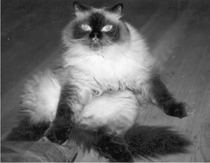
This book is inspired by, and dedicated to, the memory of my beloved companion Kaos (19882006), whom I affectionately called the porpoise of life.
KAOS, THE PORPOISE OF LIFE
I called him Kaos poody, silly willy, and bandini.
I called him funny bunny, budrella and hoodini.
I called him principiccio, Buddah-udah, and the snortus,
But if I dare tell the truth, he gives life sweetest porpoise.
He wasnt like McCavity, and neither was he Wizard,
Defying laws of gravity, and deftly catching lizards.
The Kaos pood-pood-nicky, fastidious with his locks,
Wasnt bad-boy Yuki, who stinks outside the box.
Yukiyu will taunt yah, and so did Kaos too.
Both can sit like Buddah, though Yuki jumps at boo,
Unlike that poopasorus, who runs throughout the house
Kaos poodie oodie, could never catch a mouse.
He was Mr. Cheivious, playing poody games,
Some of them were devious, always without aim.
Even supercilious, that teaser entertained.
Kaos Trouble Poody, it was his middle name.
He nibbled on the rubber plants, they always made him sick.
Too lazy to go chasing ants, wet saucy food he licked.
Dont let him near the plastic, and ribbons even worse,
He swallowed it fantastic, too messy for this verse!
I called him Kaos poody, poodini and poop-snort.
I loved him more than anything, his life was much too short.
I prodded and I poked him, jelly belly stayed amorphous,
Though Nietzsche taught me many things, he gives life sweetest porpoise.
Toilet paper he unwound, to watch it piling up.
Trinkets ever lost he found, tried drinking from your cup.
He jumped in the Jacuzzi, to see if he could swim.
He spoiled pancakes for Suzi, and wrecked the plate for Tim.
Walking on the table, sleeping on the desk,
His fur was soft as sable, and smelled sweet gingeresque.
Wearing furry slippers, sliding cross the floor,
Giving gifts of gentle purrs, I loved to hear him snore.
Blue eyes like sapphire planets, magic stuff of dreams,
Attracting folks like magnets, this cats not what he seems.
Some confounded people, fearing an attack
Had the gall to ask me, isnt that a yak?!
Escaping like Hoodini, nonchalantly sauntered out.
Hiding like a meanie, til I heard his snorting snout.
Riding magic carpets, then choreographed a dance.
Im forever in his debt, for furry-covered pants.
The Limpet was not graceful, he ruined Wizards hunt
By rushing at a chipmunk, impulsive silly stunt.
Then Wizard had to slap him, and right across the face,
A lover not a fighter, he laughed without disgrace.
I called him Kaos poody, silly willy, and bandini.
I called him the snooda, tuna-luna, and zucchini.
I called him seal-point princess, burry furry, and the orkus,
To all of my philosophies, he gives life sweetest porpoise.
Unlike a dog he wouldnt come, whatever name I used.
Just seeing him uplifted me, my spirits he amused.
I miss that snortus porpoise, I cry for him at night,
His regal presence haunts me, but I must not lose sight.
All roly-polyed into one: wisdom, calm, and strife,
Most beautiful companion, the porpoise of my life.
Although I would have to write poetry, if only I could, to even begin to express my gratitude, I extend my heartfelt thanks to my family, especially Beni, Yuki, Hurrican, and Mayo; and to Rosario, who not only appreciates the importance of Kaos but also has shown how poetry can approach the depths of love.
I would like to thank Kalpana Seshadri-Crooks, who on an outing with her beautiful collies and me, suggested that I write a book on animals. Her feedback on a version of the first two chapters is also appreciated, especially because it led to the notion of animal pedagogy. I would also like to thank Fred Evans, Leonard Lawlor and Eduardo Mendieta for their extremely thoughtful and helpful comments on an early draft of the manuscript. I am grateful for Wendy Lochners encouragement throughout this project. Many others have helped me along the way, including Ellen Armour, Walter Brogan, Ed Casey, Tina Chanter, Beth Conklin, Colin Dayan, Lara Giordano, Lisa Guenther, Adrian Johnston, Elissa Marder, Elaine Miller, Mary Rawlinson, Alison Suen, Lisa Walsh, Cynthia Willett, David Wood, and Emily Zakin.
I would also like to acknowledge that parts of appeared as Animal Pedagogy: The Origin of Man in Rousseau and Herder, Culture, Theory and Critique 47, no. 2 (2006):10731. Thanks to those journals for allowing me to use this same material here.
 |
Biting the Hand That Feeds You
The Role of Animals in Philosophies of Man |
On October 3, 2003, after years of performing in the Las Vegas show Siegfried & Roy, Montecore, a white tiger, attacked Roy Horn and nearly killed him. The attack sparked a debate about why the tiger bit Roy and dragged him off stage by the neck. Some people claimed that the tiger was trying to protect Roy, who had tripped and fallen; others speculated that the tiger sensed Roys impending stroke; some blamed a big-haired woman in the front row; others suggested a thyroid disorder; and some insisted that a tiger is an unpredictable wild predator who will attack without reason or warning. Late-night television was full of jokes about the big cat. Later, Roy insisted that the tiger was trying to protect him, possibly sensing his stroke. He maintained that the tiger was acting on a benevolent instinct, perhaps a sixth sense unavailable to humans, and intended no harm. Roy still calls Montecore his lifesaver. Was the attack inevitable or a freak accident?
These speculations about Roys accident suggest that questions of the animal mind, and of the animal more generally, are still unanswered. Indeed, we could say that Roy performs our conflicted relationship with animals: his seemingly paradoxical attempt to master them through love, his sense of himself so closely connected to his animals, and the fact that he made his living by exhibiting them and training them. Roys accident reveals the illusionists most profound illusion: that he can master animals. That is, the accident was a



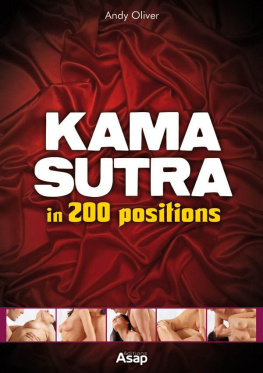

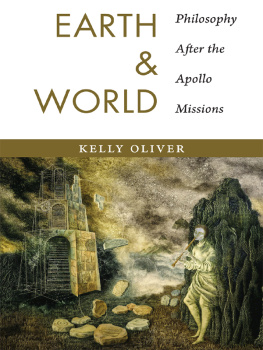
![Oliver - Around the World with One Direction - The True Stories as told by the Fans]](/uploads/posts/book/100930/thumbs/oliver-around-the-world-with-one-direction-the.jpg)


